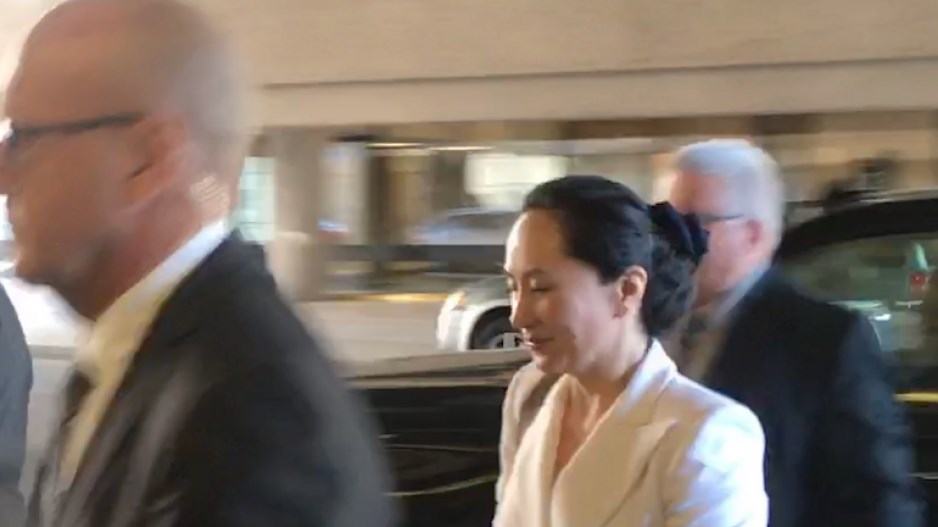Huawei Technologies CFO Meng Wanzhou has lost her bid to loosen her bail conditions to allow unsupervised movement outside her home outside curfew hours.
BC Supreme Court judge William Ehrcke said in his decision that Meng’s application – which presented four points where it felt the circumstances surrounding the extradition proceedings had changed and required the change in bail conditions – did not provide adequate supporting evidence.
“I remain of the view that condition imposed [originally in 2018] is the minimum that is required to ensure Ms. Meng appears in court [for extradition proceedings],” Ehrcke said in a bail hearing announcing his decision this morning, noting that the fact Meng is not a citizen of Canada, has immense resources and is facing serious charges in the United States all amount to enough reasons to maintain current bail conditions.
Meng had applied for the loosening of bail rules in early January, with husband Liu Xiaozong telling the court that he fears of Meng’s health and safety during the COVID pandemic because she cannot drive herself under bail conditions, requiring her to ride in a car with three security agents from Lions Gate Risk Management.
Liu said Meng’s history of hypertension and her being a thyroid cancer survivor meant she is at a higher risk of serious illness from COVID-19 if exposed through one of the Lions Gate agents appointed by the court to ensure Meng appears for her extradition hearings in Vancouver as it progresses.
Ehrcke, however, said the defence presented no medical evidence on that front, adding that a case precedent cited by Meng lawyers, about prison inmates being at an increased risk of contracting COVID in tight enclosed spaces, did not apply to the case at hand.
“There was no evidence presented ... about her current state of health or anything that would indicate additional threat facing any 48-year-old woman,” Ehrcke said. “The [prison case precedent] was about the inmates’ inability to self-isolate where there are no personal cells. Ms. Meng has the ability to self-isolate if she so chooses.”
Ehrcke added that the only time she is required to ride in a car with Lions Gate agents – going to court from her Shaughnessy home and back – is a short distance, and agents are required to mask up during the short 10-15 minute drive.
“I’m satisfied that the current arrangement does not pose an unacceptable risk,” Ehrcke said.
The court decision focused on the four supposed “material changes” to circumstance that Meng’s defence presented, of which the COVID threat was the one under the heaviest assessment by Ehrcke. The other three – Meng’s continued compliance to current bail conditions showing a low threat of flight, the fact that the extradition hearing had found air of reality to abuse-of-process allegations by Meng against U.S./Canadian authorities, as well as changes in bail release laws in Canada – were more summarily dismissed in Friday’s decision.
In particular, Ehrcke said, the defence’s use of case precedents of good behaviour under bail release leading to change in conditions showed the defendants in those cases had lengthy criminal records, meaning that compliance to bail conditions amounted to a material change for changing those conditions.
“The circumstances in Ms. Meng’s case is completely different,” Ehrcke said. “The [original] bail conditions set in December 2018 was based on the fact that Ms. Meng had no criminal record.... She is expected to comply with conditions, and that she has does not indicate a material change.”
Ehrcke also placed considerable emphasis on the fact that Lions Gate CEO Scot Filer was one of the original “sureties” in the Meng bail conditions, meaning that Filer put his name on the legal line to ensure the 2018 bail conditions were appropriate to ensure Meng’s appearance in court for extradition hearings.
The fact that Filer has opposed the loosening of bail conditions to remove daytime security details from following Meng – even if the defence presented the fact Lions Gate would lose significant income if bail conditions were loosened in that fashion – was a significant factor in the court’s decision, since the original conditions were founded on Filer’s and Lions Gate’s promise to ensure Meng’s compliance.
The case now moves back to the formal extradition arguments starting March 1.




